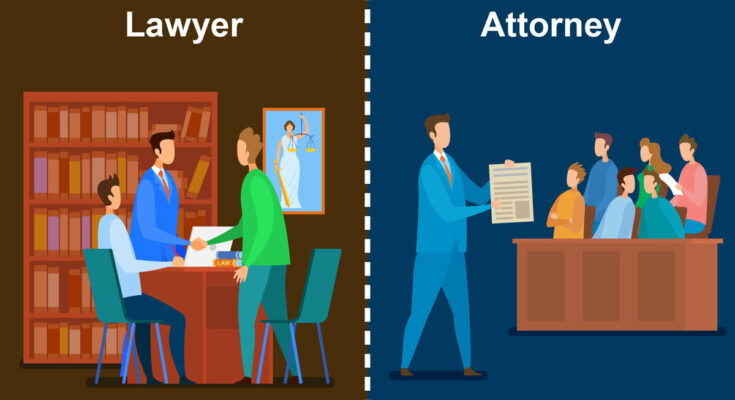Introduction
An attorney, also known as a lawyer, is a professional licensed to practice law, represent clients in legal matters, and provide legal advice. Attorneys play a crucial role in the justice system, helping individuals, businesses, and organizations navigate complex legal landscapes. This article explores the different types of attorneys, their responsibilities, and when it’s essential to hire one.
Types of Attorneys
Personal Injury Attorneys
Personal injury attorneys represent clients who have been injured due to the negligence or wrongdoing of others. This can include car accidents, medical malpractice, workplace injuries, and slip-and-fall incidents.
- Responsibilities: Investigate claims, gather evidence, negotiate with insurance companies, and represent clients in court.
- When to Hire: When you have been injured and need compensation for medical bills, lost wages, and pain and suffering.
Criminal Defense Attorneys
Criminal defense attorneys represent individuals or entities accused of criminal conduct. They defend clients against charges ranging from minor offenses to serious felonies.
- Responsibilities: Advise clients on their rights, negotiate plea deals, prepare and present defense cases in court, and appeal convictions.
- When to Hire: When you are facing criminal charges and need legal representation to protect your rights and achieve the best possible outcome.
Family Law Attorneys
Family law attorneys handle legal issues related to family relationships, such as divorce, child custody, adoption, and domestic violence.
- Responsibilities: Draft legal documents, mediate disputes, represent clients in family court, and provide advice on family-related matters.
- When to Hire: When dealing with divorce, child custody disputes, adoption processes, or any other family-related legal issues.
Estate Planning Attorneys
Estate planning attorneys help clients prepare for the management and distribution of their assets after death. They also assist with creating documents such as wills, trusts, and powers of attorney.
- Responsibilities: Draft and review estate planning documents, advise on tax implications, and ensure that clients’ wishes are carried out.
- When to Hire: When you need to create or update your will, establish a trust, or plan for the future management of your estate.
Corporate Attorneys
Corporate attorneys, also known as business attorneys, advise businesses on legal matters related to their operations. This can include contract negotiation, mergers and acquisitions, compliance issues, and intellectual property.
- Responsibilities: Draft and review contracts, provide regulatory compliance advice, represent the company in legal disputes, and handle corporate governance matters.
- When to Hire: When starting a business, negotiating contracts, dealing with regulatory issues, or handling mergers and acquisitions.
Employment Attorneys
Employment attorneys specialize in issues related to the workplace, such as employee rights, discrimination, wrongful termination, and labor law compliance.
- Responsibilities: Advise employers and employees on their rights and obligations, represent clients in employment disputes, and ensure compliance with labor laws.
- When to Hire: When facing workplace discrimination, wrongful termination, or when an employer needs advice on employment law compliance.
Intellectual Property Attorneys
Intellectual property (IP) attorneys help clients protect their creations, inventions, and brands. This includes copyrights, trademarks, patents, and trade secrets.
- Responsibilities: File and defend patents, register trademarks, litigate IP disputes, and advise on IP strategy.
- When to Hire: When you need to protect your intellectual property, such as filing for a patent, trademark, or defending against IP infringement.
Responsibilities of an Attorney
Legal Advice
Attorneys provide clients with expert advice on legal matters, helping them understand their rights, obligations, and the potential outcomes of their actions.
Representation
Attorneys represent clients in negotiations, mediations, arbitrations, and court proceedings, advocating on their behalf to achieve the best possible outcome.
Documentation
Attorneys draft, review, and file legal documents, such as contracts, wills, pleadings, and motions, ensuring that they are accurate and comply with legal requirements.
Investigation
Attorneys investigate the facts of a case, gather evidence, interview witnesses, and perform legal research to build a strong case for their clients.
Negotiation
Attorneys negotiate settlements and agreements on behalf of their clients, striving to resolve disputes without the need for prolonged litigation.
Ethical Conduct
Attorneys must adhere to a strict code of professional ethics, maintaining client confidentiality, avoiding conflicts of interest, and practicing law with integrity.
When to Hire an Attorney
Legal Complexities
If you are facing a legal issue that is complex or unfamiliar, hiring an attorney can help you navigate the intricacies of the law and avoid potential pitfalls.
Serious Consequences
When the outcome of a legal matter can significantly impact your life, such as criminal charges, divorce, or significant financial transactions, it is crucial to have professional legal representation.
Dispute Resolution
If you are involved in a dispute that you cannot resolve on your own, an attorney can help mediate, negotiate, or represent you in court to achieve a fair resolution.
Protecting Rights
Attorneys help protect your legal rights, ensuring that you are treated fairly and that your interests are safeguarded in legal proceedings.
Compliance and Risk Management
For businesses, hiring an attorney is essential for ensuring compliance with laws and regulations, minimizing legal risks, and handling legal issues that arise in the course of operations.
Conclusion
Attorneys play a vital role in the legal system, providing expertise and representation to help individuals and businesses navigate legal challenges. By understanding the different types of attorneys and their responsibilities, you can make informed decisions about when to seek legal counsel. Whether you need assistance with a personal injury claim, a criminal defense case, a family law matter, or business-related legal issues, hiring the right attorney can make a significant difference in the outcome of your case and your overall legal experience.
To keep updated with the latest posts, click here.



